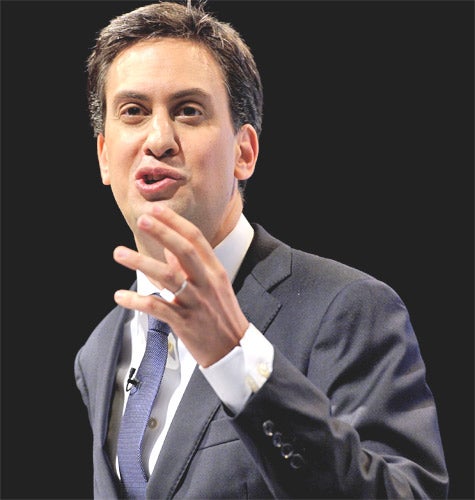Miliband decoded: What Ed said - and what he really means

Your support helps us to tell the story
From reproductive rights to climate change to Big Tech, The Independent is on the ground when the story is developing. Whether it's investigating the financials of Elon Musk's pro-Trump PAC or producing our latest documentary, 'The A Word', which shines a light on the American women fighting for reproductive rights, we know how important it is to parse out the facts from the messaging.
At such a critical moment in US history, we need reporters on the ground. Your donation allows us to keep sending journalists to speak to both sides of the story.
The Independent is trusted by Americans across the entire political spectrum. And unlike many other quality news outlets, we choose not to lock Americans out of our reporting and analysis with paywalls. We believe quality journalism should be available to everyone, paid for by those who can afford it.
Your support makes all the difference.On the economy
"The Labour Party lost trust on the economy. And under my leadership, we will regain that trust. I am determined to prove to you that the next Labour government will only spend what it can afford. That we will live within our means. That we will manage your money properly."
How can you "prove", in opposition, what the next Labour government will do when the last Labour government failed to do it? By talking about "new fiscal rules" and looking straight at the camera.
On Murdoch
"I knew I was breaking rule number one of British politics: don't mess with Rupert Murdoch. I did it because it was right. That's the lesson I have learned most clearly in the last year. The lesson that you've got to be willing to break the consensus, not succumb to it."
Just as he distances himself from Blair's permanent courtship of the Murdoch empire, he sounds most like the former prime minister, learning lessons about being a conviction politician and defying the consensus.
On the riots
"I saw in Manchester, people of all generations, who came out the next morning to get the city back on its feet. Those young people with the brooms. With such great people, how have we ended up with the problems we face? It's because of the way we have chosen to run our country. Not just for a year or so but for decades."
Now this is where it gets odd. Things have been out of joint for decades, including 13 years of Labour government. He's defining himself in opposition not just to David Cameron but to Gordon Brown, Tony Blair, John Major and Margaret Thatcher. Crystal clear?
On Labour's history
"There are hard lessons here for my party which some won't like. Some of what happened in the 1980s was right. It was right to let people buy their council houses. It was right to cut tax rates of 60, 70, 80 per cent. And it was right to change the rules on the closed shop, on strikes before ballots."
Hang on. Things have gone wrong for decades. Except that some of the things that the Thatcher government did were right.
On New Labour
"The rebuilt schools, new hospitals, more police. The minimum wage, tax credits, the new deal. Half a million children lifted out of poverty... My party is proud of that record. And so am I."
So everything went wrong for decades, apart from the good things that Thatcher did and the "proud record" of New Labour. Wait, the bad stuff's coming...
On the banking crisis
"Who's been rewarded in this economy? Take Fred Goodwin. He was at the heart of the banking crisis. Compare him to Sir John Rose, former Chief Executive of Rolls-Royce, a great British business leader, creating wealth and keeping jobs in this country. He is the true face of British business."
The villain – boo! The hero – hurrah! The "vast majority" of British business has the right "values" and this huge crisis of "values" that he wants to change is confined to a few easy targets in the City of London. This speech is making less sense the longer it grows.
On his economic vision
"Britain's future will be built not on credit default swaps but on creative industries. Not low wages and high finance, but low carbon and high tech. Not financial engineering, but real engineering. Of course, the banks and financial services are important to Britain. They employ people right across the country. They will still be important to Britain in the future. But they must change so that they are part of the solution to our economic future, not part of the problem."
Bankers? Very bad. Financial sector that employs a lot of people and earns money for Britain? Very good. Contradiction resolved with a cliché. Job done.
On his ambitions
"I aspire to be your Prime Minister not for more of the same, but to write a new chapter in our country's history. The promise of Britain lies in its people. The tragedy of Britain is that it is not being met. My mission, our mission [is] to fulfil the promise of each so we fulfil the promise of Britain."
The peroration, delivered in his "peroration voice". It's all about a "new bargain", in which his speech's contradictions will be resolved by clichés.
John Rentoul is chief political commentator of 'The Independent on Sunday'
Join our commenting forum
Join thought-provoking conversations, follow other Independent readers and see their replies
Comments